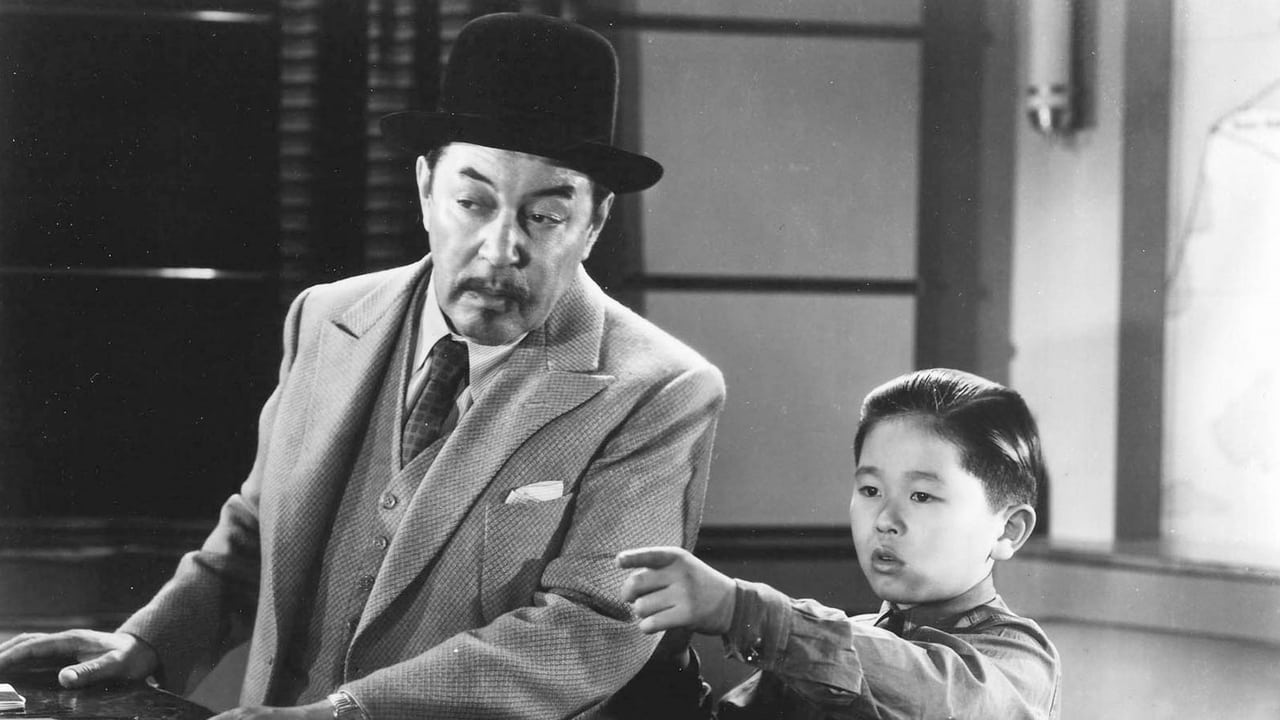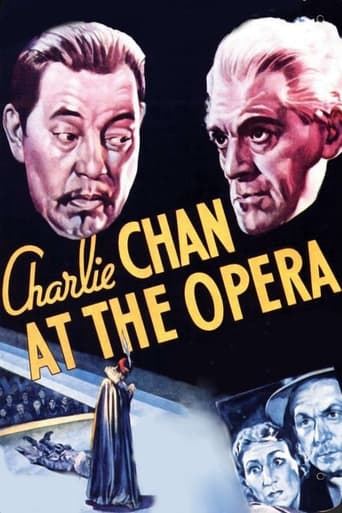Hellen
I like the storyline of this show,it attract me so much
AniInterview
Sorry, this movie sucks
Tedfoldol
everything you have heard about this movie is true.
Taraparain
Tells a fascinating and unsettling true story, and does so well, without pretending to have all the answers.
JohnHowardReid
Copyright 5 December 1936 by 20th Century-Fox Film Corp. New York opening at the Palace: 4 December 1936. U.S. release: 8 January 1937. U.K. release: 16 November 1936. 6,175 feet. 68 minutes. Censored to 5,783 feet (64 minutes) in the U.K.SYNOPSIS: Having succesfully wrapped up the race track murder case, Charlie prepares to return to Honolulu. But first he becomes involved in the hunt for a madman who has found his way into the Los Angeles Opera Company during Oscar Levant's "Carnival".NOTES: Number thirteen of the sixteen pictures made by Warner Oland in the series, and the second of three to be directed by Lucky Humberstone (who also directed Sidney Toler in his initial entry, Charlie Chan in Honolulu). Shooting commenced 16 September 1936. This entry gives movie buffs a good look at Nedda Harrigan. Never heard of her? She was married to Walter Connolly from 1923 until his death in 1940. In 1945, she married Joshua Logan. That union lasted until his death in 1988. A stage actress, Miss Harrigan made only fifteen films, but they included The Case of the Black Cat, Thank You Mr Moto, Men Are Such Fools, Devil's Island and Scandal Sheet. Charlotte Henry, of course is Alice in Wonderland, though she was actually twenty years old when she made that movie in 1933. She still seems appropriately under-age in this picture too.COMMENT: Whilst it easily ranks as the most popular of the entire Chan series (thanks mostly to the casting of cult figure Boris Karloff as Charlie's adversary), Charlie Chan at the Opera in at least one significant way rates as the least typical. True, Keye Luke is along to both hinder and assist Pop, and an easily disparaged comic detective (William Demarest) complete with pratfalls has also been cast. Charlie is also allowed a fair quota of his famous aphorisms. What's more, the movie has been lensed on an exuberant budget with lots of action thrills and atmospheric effects in both lighting and sets. But where's the mystery? Gravelle commits all the murders, doesn't he? Well, let me tell you, it came as quite a shock to me to discover (right at the fade-out) that he didn't. Not even one of them. Even the expert compiler of the movie data base credits has obviously been confused by the screenplay's deliberate obfuscations, as he still assigns one murder to the madman even though the screenplay offhandedly explains it away in the last few seconds of the climactic action.Mind you, Frank Conroy often thrusts himself center stage, but he's such an obvious red herring no-one is going to take the slightest notice of him. Besides the movie itself (all but explicitly) shows us Gravelle actually committing the crimes. (Oddly, the VHS cover features a head shot of Oland and a still of Oland with Conroy, but no picture of Karloff at all). Another problem is that the opera itself proves something of a distraction. I'm not referring to the off-stage scenes. Or even to the menace Karloff so slickly infiltrates into his portrait of Mephistopheles. All this material is fascinating. I mean the singing. Good stuff, but it's obviously not Karloff's voice. Humberstone directs with precision. It's all very slick and highly professional. In fact his work is as polished as an "A" picture. But that's also a bit disappointing. He never really lets himself go, as he does so excitingly in C.C. at the Race Track.
DKosty123
This is a very good entry in this film series. Relatively short at less than an hour and a half, it seems a likely setting to the last section of the Marx Brothers Night At The Opera without the Comedy. The regular cast of Warner Oland and Keye Luke are joined by a very active William Demarest and the great suspect escaped from a mental institution - Boris Karloff. Spoiler, much like a later movie Karloff did with Abbott and Costello, Boris Karloff's Gravelle character is used much the same way. In this one, Karloff appears to sing Opera and sounds like he can, and play the piano. It is not often that happens in any movie.Kitti and Lilli Rochelle= Charlotte Henry & Margaret Irving, and Mme. Anita Barelli -Nedda Harrigan are the ladies of the cast and 2 of them sing too. One of them is the murder victim.Charlie Chan is under the dead line seriously while working this one a he is risking running late for his transportation back home. Lee Chan as Luke is credited in this one, is of some help but a usual is mostly 1 step behind famous father.The writing is solid here and it does not hurt that one of the script writers also has a credit for 1925's silent film version of Ben Hur. Like most Chan films, the plot is easy to follow, there are more than one red herrings in this script, and Chan provides much wisdom and skill sorting out the clues ahead of Luke and Sgt Kelly(Demarest).There are references to China in this one, though after reading the Nazi's banned this film in Germany in 1936, it is not real easy to see why they did.
bkoganbing
A madman loose in an opera house is the background for Charlie Chan to investigate a double murder of leading singers in Charlie Chan At The Opera. Son Lee Chan played by Keye Luke even gets in the act as a member of the chorus with his fraternity buddies.Boris Karloff is the madman, but if I had gone through what he had been through I'm sure I would have become unhinged myself. Some years back Karloff was trapped in a burning opera house by his cheating wife and her tenor lover. He was presumed dead and burned up, but in fact has been an amnesiac patient in a mental asylum. A glance at a newspaper story about the opera brought his memory and a resolve to escape the asylum and seek out his tormentors.This probably was Karloff's way of playing and not playing the Phantom Of The Opera. As he was in the Frankenstein films or playing The Mummy, Karloff is both a frightening yet pitiable figure. He truly steals this film from Warner Oland as Charlie Chan.As for Oland he has to solve a pair of murders that occur while Karloff is on the loose. In that he has to work with thick as a brick police sergeant William Demarest. In fact Demarest makes a few racial remarks in Oland's direction, but in the end he's a convert to the wisdom of Chinese parables.This is one of the best Charlie Chan features and one of the best of the Oland Chan films which were given much better production than later when the series moved to Monogram.
r-c-s
I have no idea whether this is T H E best Charlie Chan movie, but it's indeed among the few top ones among dozens that made up the series. This one mixes four separate story lines with good plot contrivance that don't get in the way: 1 a young couple wanting to get married but having their dream hampered. 2 a wife and 3 a husband who want to punish their adulterous spouses. 4 a mentally ill amnesiac who escapes from an asylum to exact revenge upon his adulterous wife who had trapped him years earlier in a building on fire. It will take time and turns to learn who is who, but all apparently have good reasons to kill a opera star...while the opera's on stage. The 'comedy moment' son#1 bit is present but doesn't get in the way and is less annoying that usual. Acting is good, although plagued by some drama queen 1930s clichés. There is also a cop who doesn't like Chinese people, but it's an odd character that sits between comedy relief and supporting roles. Recommended.

